Challenges and Best Practices in Corporate Social Responsibility and Sustainability in the Food Industry
VerifiedAdded on 2023/01/10
|18
|3782
|83
AI Summary
This report discusses the challenges and best practices in corporate social responsibility (CSR) and sustainability in the food industry. It explores the key challenges faced by businesses in implementing CSR practices and provides recommendations for businesses to be more responsible by considering global considerations.
Contribute Materials
Your contribution can guide someone’s learning journey. Share your
documents today.
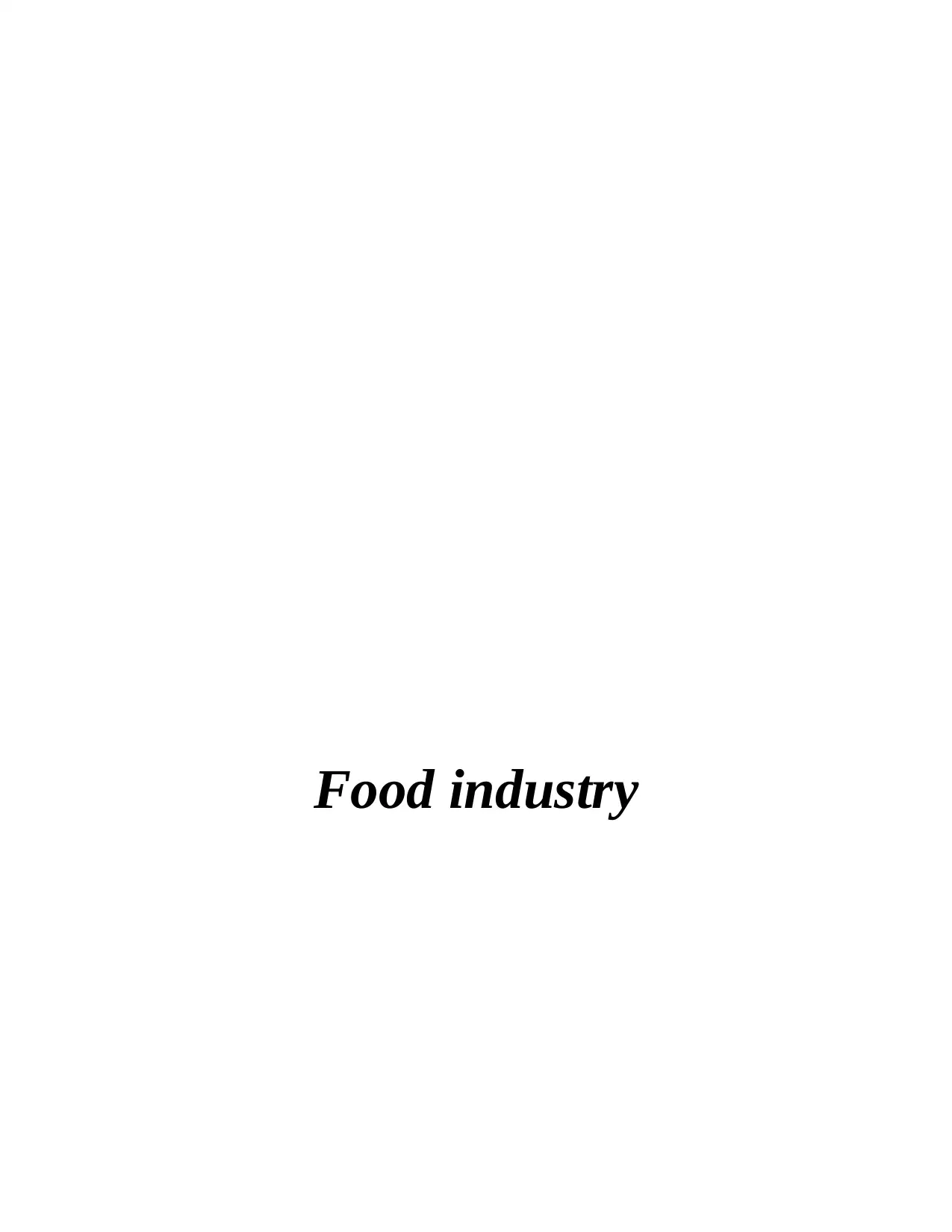
Food industry
Secure Best Marks with AI Grader
Need help grading? Try our AI Grader for instant feedback on your assignments.
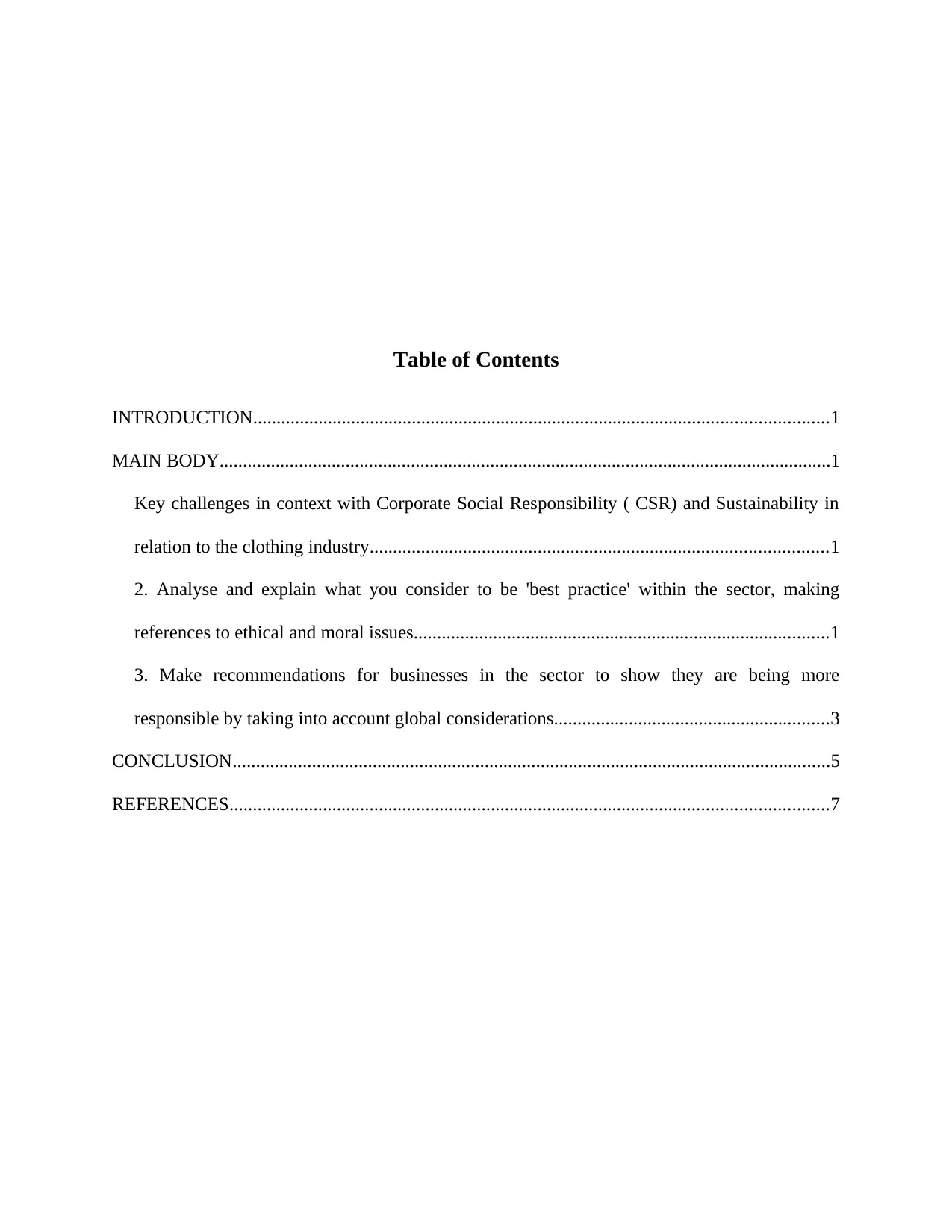
Table of Contents
INTRODUCTION...........................................................................................................................1
MAIN BODY...................................................................................................................................1
Key challenges in context with Corporate Social Responsibility ( CSR) and Sustainability in
relation to the clothing industry..................................................................................................1
2. Analyse and explain what you consider to be 'best practice' within the sector, making
references to ethical and moral issues.........................................................................................1
3. Make recommendations for businesses in the sector to show they are being more
responsible by taking into account global considerations...........................................................3
CONCLUSION................................................................................................................................5
REFERENCES................................................................................................................................7
INTRODUCTION...........................................................................................................................1
MAIN BODY...................................................................................................................................1
Key challenges in context with Corporate Social Responsibility ( CSR) and Sustainability in
relation to the clothing industry..................................................................................................1
2. Analyse and explain what you consider to be 'best practice' within the sector, making
references to ethical and moral issues.........................................................................................1
3. Make recommendations for businesses in the sector to show they are being more
responsible by taking into account global considerations...........................................................3
CONCLUSION................................................................................................................................5
REFERENCES................................................................................................................................7

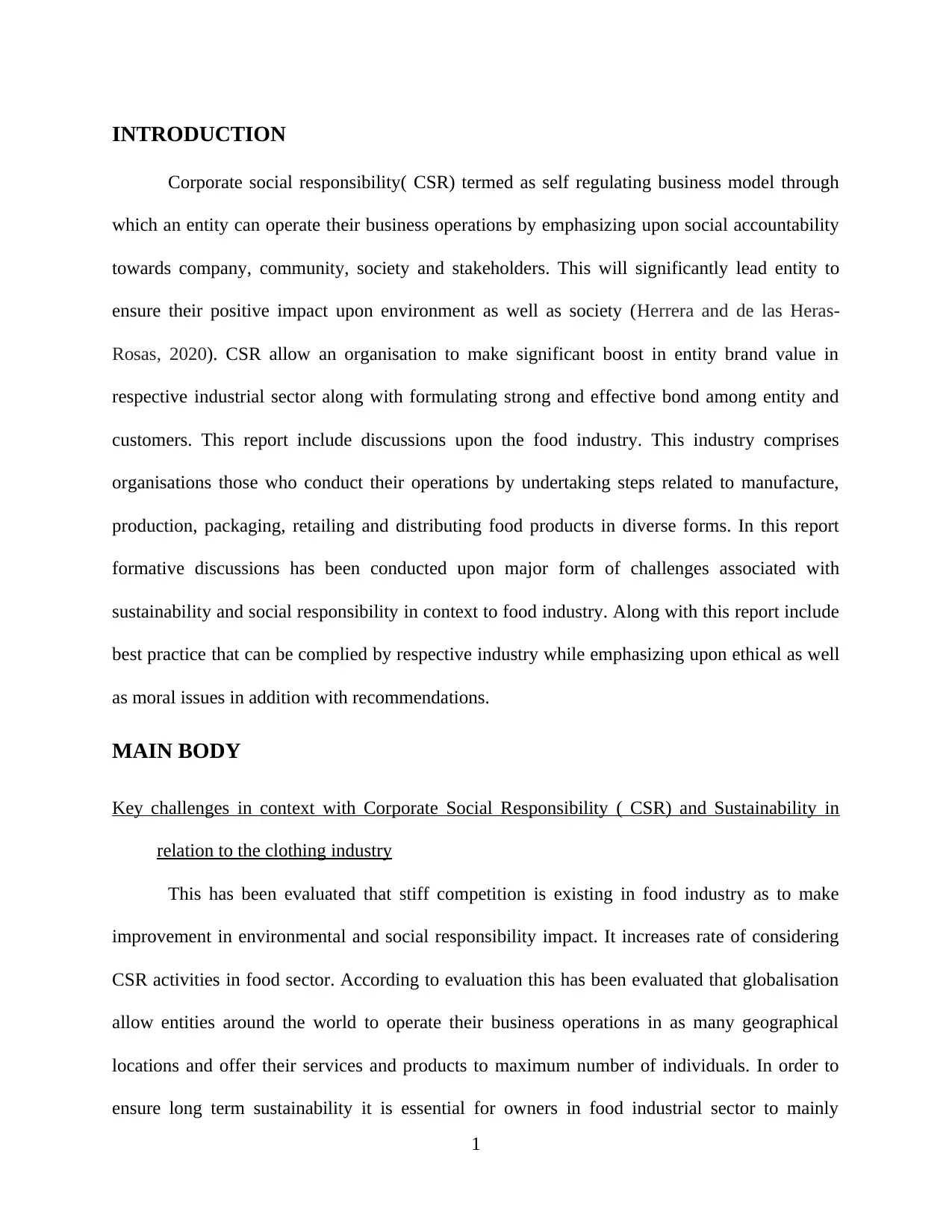
INTRODUCTION
Corporate social responsibility( CSR) termed as self regulating business model through
which an entity can operate their business operations by emphasizing upon social accountability
towards company, community, society and stakeholders. This will significantly lead entity to
ensure their positive impact upon environment as well as society (Herrera and de las Heras-
Rosas, 2020). CSR allow an organisation to make significant boost in entity brand value in
respective industrial sector along with formulating strong and effective bond among entity and
customers. This report include discussions upon the food industry. This industry comprises
organisations those who conduct their operations by undertaking steps related to manufacture,
production, packaging, retailing and distributing food products in diverse forms. In this report
formative discussions has been conducted upon major form of challenges associated with
sustainability and social responsibility in context to food industry. Along with this report include
best practice that can be complied by respective industry while emphasizing upon ethical as well
as moral issues in addition with recommendations.
MAIN BODY
Key challenges in context with Corporate Social Responsibility ( CSR) and Sustainability in
relation to the clothing industry
This has been evaluated that stiff competition is existing in food industry as to make
improvement in environmental and social responsibility impact. It increases rate of considering
CSR activities in food sector. According to evaluation this has been evaluated that globalisation
allow entities around the world to operate their business operations in as many geographical
locations and offer their services and products to maximum number of individuals. In order to
ensure long term sustainability it is essential for owners in food industrial sector to mainly
1
Corporate social responsibility( CSR) termed as self regulating business model through
which an entity can operate their business operations by emphasizing upon social accountability
towards company, community, society and stakeholders. This will significantly lead entity to
ensure their positive impact upon environment as well as society (Herrera and de las Heras-
Rosas, 2020). CSR allow an organisation to make significant boost in entity brand value in
respective industrial sector along with formulating strong and effective bond among entity and
customers. This report include discussions upon the food industry. This industry comprises
organisations those who conduct their operations by undertaking steps related to manufacture,
production, packaging, retailing and distributing food products in diverse forms. In this report
formative discussions has been conducted upon major form of challenges associated with
sustainability and social responsibility in context to food industry. Along with this report include
best practice that can be complied by respective industry while emphasizing upon ethical as well
as moral issues in addition with recommendations.
MAIN BODY
Key challenges in context with Corporate Social Responsibility ( CSR) and Sustainability in
relation to the clothing industry
This has been evaluated that stiff competition is existing in food industry as to make
improvement in environmental and social responsibility impact. It increases rate of considering
CSR activities in food sector. According to evaluation this has been evaluated that globalisation
allow entities around the world to operate their business operations in as many geographical
locations and offer their services and products to maximum number of individuals. In order to
ensure long term sustainability it is essential for owners in food industrial sector to mainly
1
Secure Best Marks with AI Grader
Need help grading? Try our AI Grader for instant feedback on your assignments.
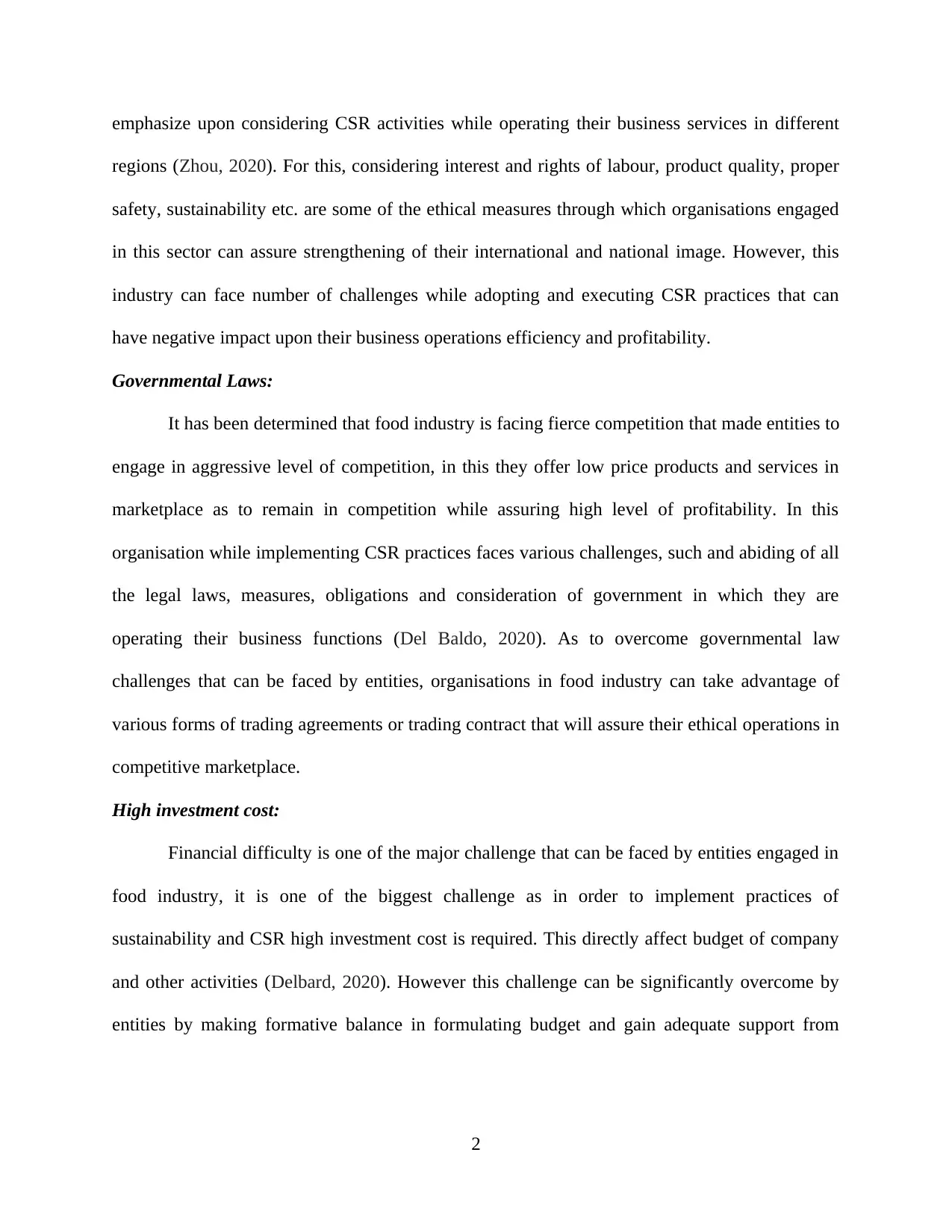
emphasize upon considering CSR activities while operating their business services in different
regions (Zhou, 2020). For this, considering interest and rights of labour, product quality, proper
safety, sustainability etc. are some of the ethical measures through which organisations engaged
in this sector can assure strengthening of their international and national image. However, this
industry can face number of challenges while adopting and executing CSR practices that can
have negative impact upon their business operations efficiency and profitability.
Governmental Laws:
It has been determined that food industry is facing fierce competition that made entities to
engage in aggressive level of competition, in this they offer low price products and services in
marketplace as to remain in competition while assuring high level of profitability. In this
organisation while implementing CSR practices faces various challenges, such and abiding of all
the legal laws, measures, obligations and consideration of government in which they are
operating their business functions (Del Baldo, 2020). As to overcome governmental law
challenges that can be faced by entities, organisations in food industry can take advantage of
various forms of trading agreements or trading contract that will assure their ethical operations in
competitive marketplace.
High investment cost:
Financial difficulty is one of the major challenge that can be faced by entities engaged in
food industry, it is one of the biggest challenge as in order to implement practices of
sustainability and CSR high investment cost is required. This directly affect budget of company
and other activities (Delbard, 2020). However this challenge can be significantly overcome by
entities by making formative balance in formulating budget and gain adequate support from
2
regions (Zhou, 2020). For this, considering interest and rights of labour, product quality, proper
safety, sustainability etc. are some of the ethical measures through which organisations engaged
in this sector can assure strengthening of their international and national image. However, this
industry can face number of challenges while adopting and executing CSR practices that can
have negative impact upon their business operations efficiency and profitability.
Governmental Laws:
It has been determined that food industry is facing fierce competition that made entities to
engage in aggressive level of competition, in this they offer low price products and services in
marketplace as to remain in competition while assuring high level of profitability. In this
organisation while implementing CSR practices faces various challenges, such and abiding of all
the legal laws, measures, obligations and consideration of government in which they are
operating their business functions (Del Baldo, 2020). As to overcome governmental law
challenges that can be faced by entities, organisations in food industry can take advantage of
various forms of trading agreements or trading contract that will assure their ethical operations in
competitive marketplace.
High investment cost:
Financial difficulty is one of the major challenge that can be faced by entities engaged in
food industry, it is one of the biggest challenge as in order to implement practices of
sustainability and CSR high investment cost is required. This directly affect budget of company
and other activities (Delbard, 2020). However this challenge can be significantly overcome by
entities by making formative balance in formulating budget and gain adequate support from
2
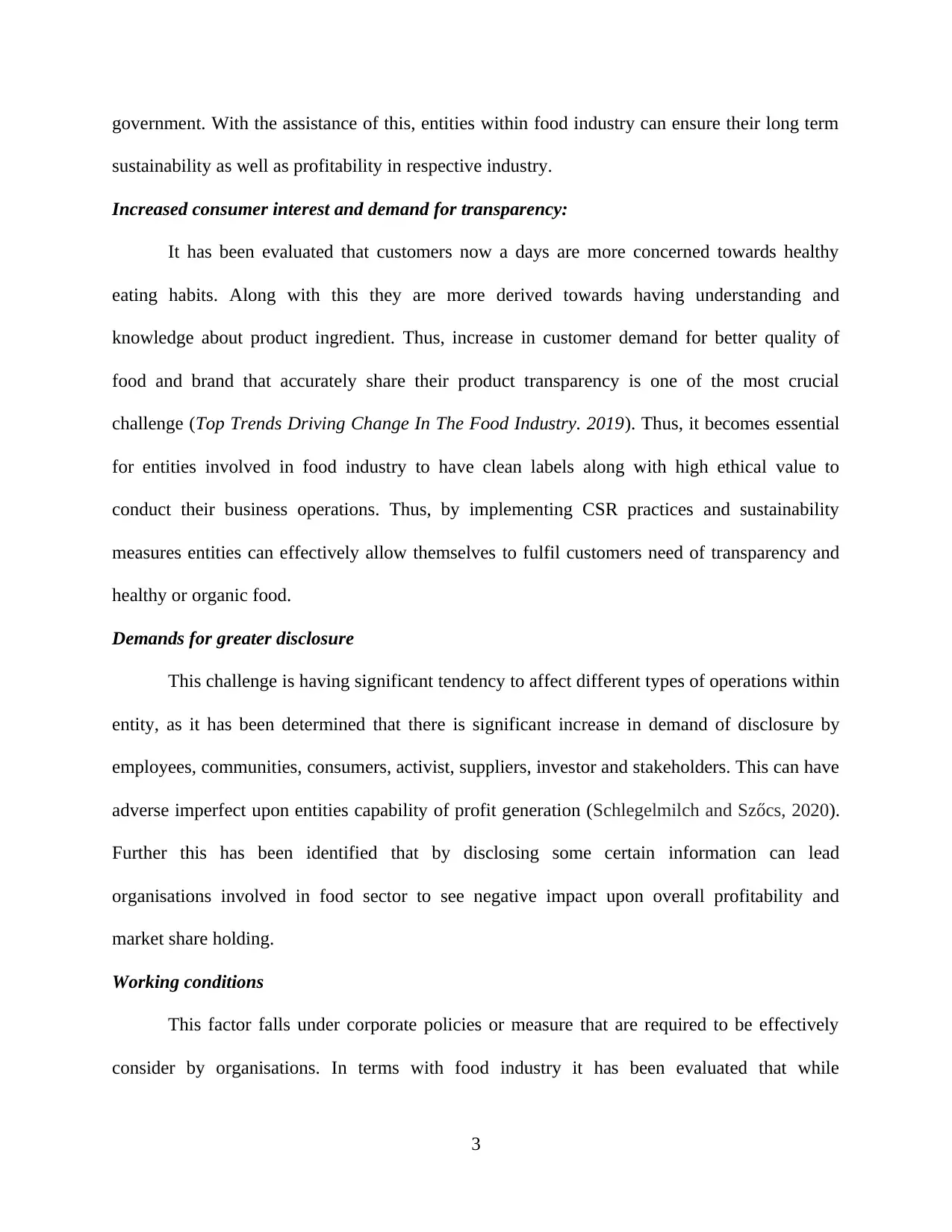
government. With the assistance of this, entities within food industry can ensure their long term
sustainability as well as profitability in respective industry.
Increased consumer interest and demand for transparency:
It has been evaluated that customers now a days are more concerned towards healthy
eating habits. Along with this they are more derived towards having understanding and
knowledge about product ingredient. Thus, increase in customer demand for better quality of
food and brand that accurately share their product transparency is one of the most crucial
challenge (Top Trends Driving Change In The Food Industry. 2019). Thus, it becomes essential
for entities involved in food industry to have clean labels along with high ethical value to
conduct their business operations. Thus, by implementing CSR practices and sustainability
measures entities can effectively allow themselves to fulfil customers need of transparency and
healthy or organic food.
Demands for greater disclosure
This challenge is having significant tendency to affect different types of operations within
entity, as it has been determined that there is significant increase in demand of disclosure by
employees, communities, consumers, activist, suppliers, investor and stakeholders. This can have
adverse imperfect upon entities capability of profit generation (Schlegelmilch and Szőcs, 2020).
Further this has been identified that by disclosing some certain information can lead
organisations involved in food sector to see negative impact upon overall profitability and
market share holding.
Working conditions
This factor falls under corporate policies or measure that are required to be effectively
consider by organisations. In terms with food industry it has been evaluated that while
3
sustainability as well as profitability in respective industry.
Increased consumer interest and demand for transparency:
It has been evaluated that customers now a days are more concerned towards healthy
eating habits. Along with this they are more derived towards having understanding and
knowledge about product ingredient. Thus, increase in customer demand for better quality of
food and brand that accurately share their product transparency is one of the most crucial
challenge (Top Trends Driving Change In The Food Industry. 2019). Thus, it becomes essential
for entities involved in food industry to have clean labels along with high ethical value to
conduct their business operations. Thus, by implementing CSR practices and sustainability
measures entities can effectively allow themselves to fulfil customers need of transparency and
healthy or organic food.
Demands for greater disclosure
This challenge is having significant tendency to affect different types of operations within
entity, as it has been determined that there is significant increase in demand of disclosure by
employees, communities, consumers, activist, suppliers, investor and stakeholders. This can have
adverse imperfect upon entities capability of profit generation (Schlegelmilch and Szőcs, 2020).
Further this has been identified that by disclosing some certain information can lead
organisations involved in food sector to see negative impact upon overall profitability and
market share holding.
Working conditions
This factor falls under corporate policies or measure that are required to be effectively
consider by organisations. In terms with food industry it has been evaluated that while
3
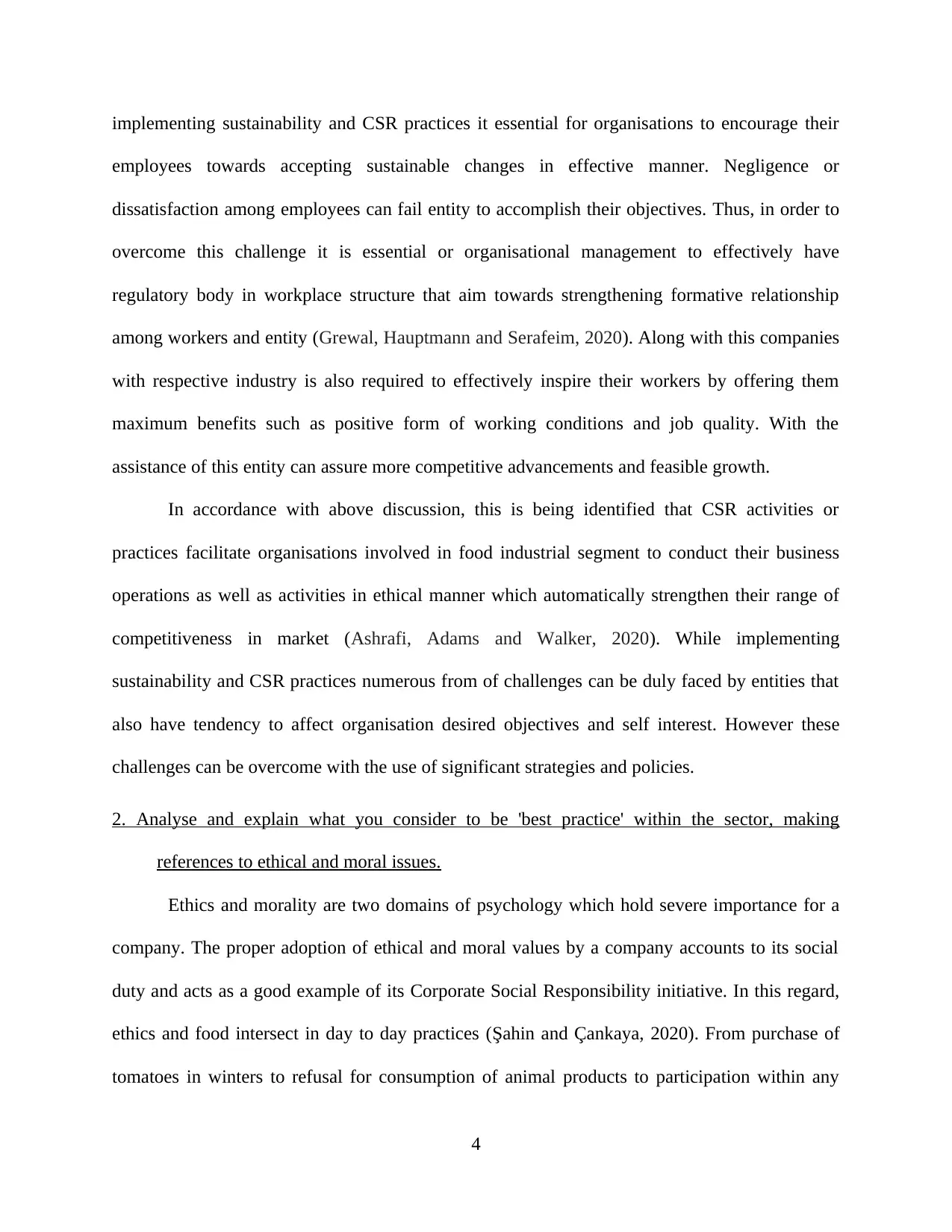
implementing sustainability and CSR practices it essential for organisations to encourage their
employees towards accepting sustainable changes in effective manner. Negligence or
dissatisfaction among employees can fail entity to accomplish their objectives. Thus, in order to
overcome this challenge it is essential or organisational management to effectively have
regulatory body in workplace structure that aim towards strengthening formative relationship
among workers and entity (Grewal, Hauptmann and Serafeim, 2020). Along with this companies
with respective industry is also required to effectively inspire their workers by offering them
maximum benefits such as positive form of working conditions and job quality. With the
assistance of this entity can assure more competitive advancements and feasible growth.
In accordance with above discussion, this is being identified that CSR activities or
practices facilitate organisations involved in food industrial segment to conduct their business
operations as well as activities in ethical manner which automatically strengthen their range of
competitiveness in market (Ashrafi, Adams and Walker, 2020). While implementing
sustainability and CSR practices numerous from of challenges can be duly faced by entities that
also have tendency to affect organisation desired objectives and self interest. However these
challenges can be overcome with the use of significant strategies and policies.
2. Analyse and explain what you consider to be 'best practice' within the sector, making
references to ethical and moral issues.
Ethics and morality are two domains of psychology which hold severe importance for a
company. The proper adoption of ethical and moral values by a company accounts to its social
duty and acts as a good example of its Corporate Social Responsibility initiative. In this regard,
ethics and food intersect in day to day practices (Şahin and Çankaya, 2020). From purchase of
tomatoes in winters to refusal for consumption of animal products to participation within any
4
employees towards accepting sustainable changes in effective manner. Negligence or
dissatisfaction among employees can fail entity to accomplish their objectives. Thus, in order to
overcome this challenge it is essential or organisational management to effectively have
regulatory body in workplace structure that aim towards strengthening formative relationship
among workers and entity (Grewal, Hauptmann and Serafeim, 2020). Along with this companies
with respective industry is also required to effectively inspire their workers by offering them
maximum benefits such as positive form of working conditions and job quality. With the
assistance of this entity can assure more competitive advancements and feasible growth.
In accordance with above discussion, this is being identified that CSR activities or
practices facilitate organisations involved in food industrial segment to conduct their business
operations as well as activities in ethical manner which automatically strengthen their range of
competitiveness in market (Ashrafi, Adams and Walker, 2020). While implementing
sustainability and CSR practices numerous from of challenges can be duly faced by entities that
also have tendency to affect organisation desired objectives and self interest. However these
challenges can be overcome with the use of significant strategies and policies.
2. Analyse and explain what you consider to be 'best practice' within the sector, making
references to ethical and moral issues.
Ethics and morality are two domains of psychology which hold severe importance for a
company. The proper adoption of ethical and moral values by a company accounts to its social
duty and acts as a good example of its Corporate Social Responsibility initiative. In this regard,
ethics and food intersect in day to day practices (Şahin and Çankaya, 2020). From purchase of
tomatoes in winters to refusal for consumption of animal products to participation within any
4
Paraphrase This Document
Need a fresh take? Get an instant paraphrase of this document with our AI Paraphraser
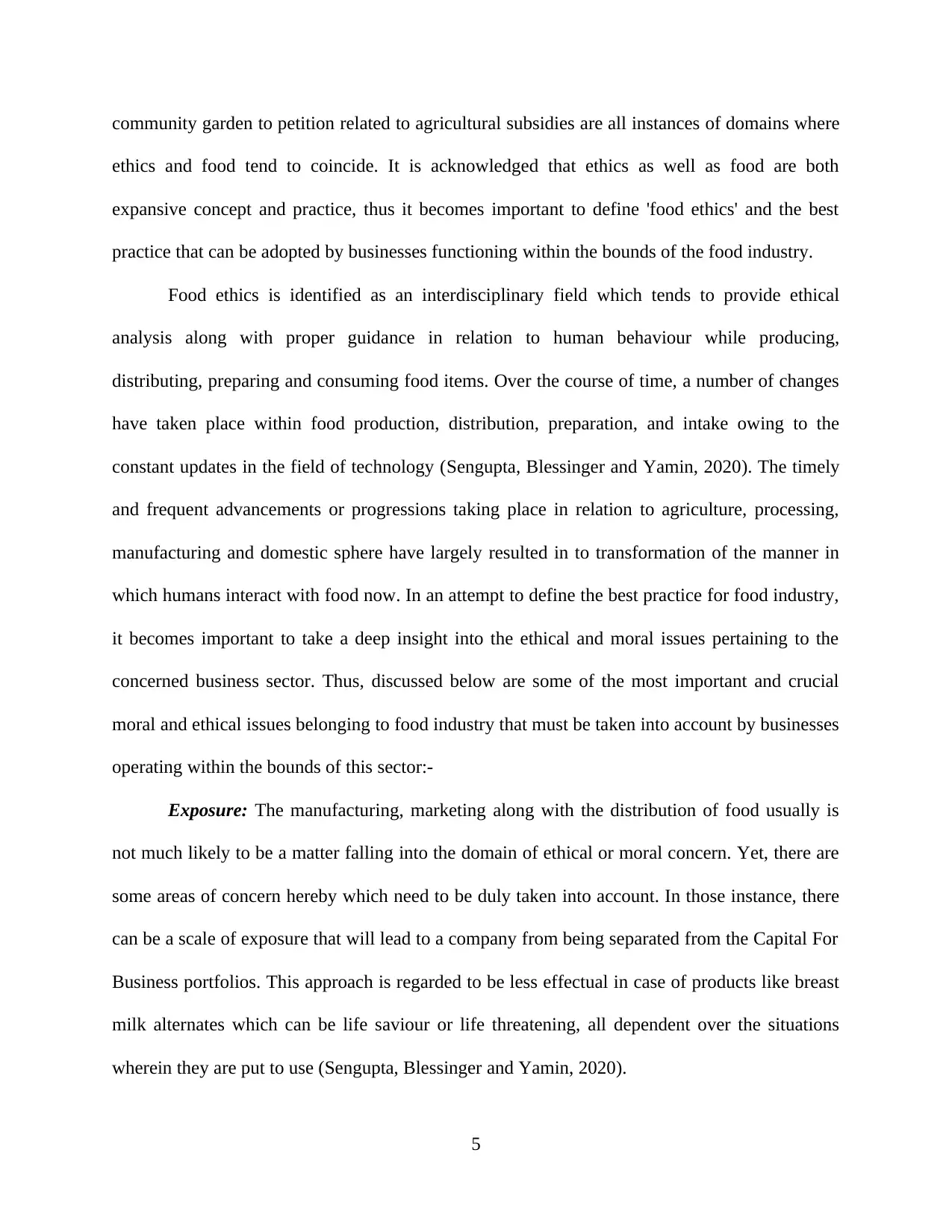
community garden to petition related to agricultural subsidies are all instances of domains where
ethics and food tend to coincide. It is acknowledged that ethics as well as food are both
expansive concept and practice, thus it becomes important to define 'food ethics' and the best
practice that can be adopted by businesses functioning within the bounds of the food industry.
Food ethics is identified as an interdisciplinary field which tends to provide ethical
analysis along with proper guidance in relation to human behaviour while producing,
distributing, preparing and consuming food items. Over the course of time, a number of changes
have taken place within food production, distribution, preparation, and intake owing to the
constant updates in the field of technology (Sengupta, Blessinger and Yamin, 2020). The timely
and frequent advancements or progressions taking place in relation to agriculture, processing,
manufacturing and domestic sphere have largely resulted in to transformation of the manner in
which humans interact with food now. In an attempt to define the best practice for food industry,
it becomes important to take a deep insight into the ethical and moral issues pertaining to the
concerned business sector. Thus, discussed below are some of the most important and crucial
moral and ethical issues belonging to food industry that must be taken into account by businesses
operating within the bounds of this sector:-
Exposure: The manufacturing, marketing along with the distribution of food usually is
not much likely to be a matter falling into the domain of ethical or moral concern. Yet, there are
some areas of concern hereby which need to be duly taken into account. In those instance, there
can be a scale of exposure that will lead to a company from being separated from the Capital For
Business portfolios. This approach is regarded to be less effectual in case of products like breast
milk alternates which can be life saviour or life threatening, all dependent over the situations
wherein they are put to use (Sengupta, Blessinger and Yamin, 2020).
5
ethics and food tend to coincide. It is acknowledged that ethics as well as food are both
expansive concept and practice, thus it becomes important to define 'food ethics' and the best
practice that can be adopted by businesses functioning within the bounds of the food industry.
Food ethics is identified as an interdisciplinary field which tends to provide ethical
analysis along with proper guidance in relation to human behaviour while producing,
distributing, preparing and consuming food items. Over the course of time, a number of changes
have taken place within food production, distribution, preparation, and intake owing to the
constant updates in the field of technology (Sengupta, Blessinger and Yamin, 2020). The timely
and frequent advancements or progressions taking place in relation to agriculture, processing,
manufacturing and domestic sphere have largely resulted in to transformation of the manner in
which humans interact with food now. In an attempt to define the best practice for food industry,
it becomes important to take a deep insight into the ethical and moral issues pertaining to the
concerned business sector. Thus, discussed below are some of the most important and crucial
moral and ethical issues belonging to food industry that must be taken into account by businesses
operating within the bounds of this sector:-
Exposure: The manufacturing, marketing along with the distribution of food usually is
not much likely to be a matter falling into the domain of ethical or moral concern. Yet, there are
some areas of concern hereby which need to be duly taken into account. In those instance, there
can be a scale of exposure that will lead to a company from being separated from the Capital For
Business portfolios. This approach is regarded to be less effectual in case of products like breast
milk alternates which can be life saviour or life threatening, all dependent over the situations
wherein they are put to use (Sengupta, Blessinger and Yamin, 2020).
5
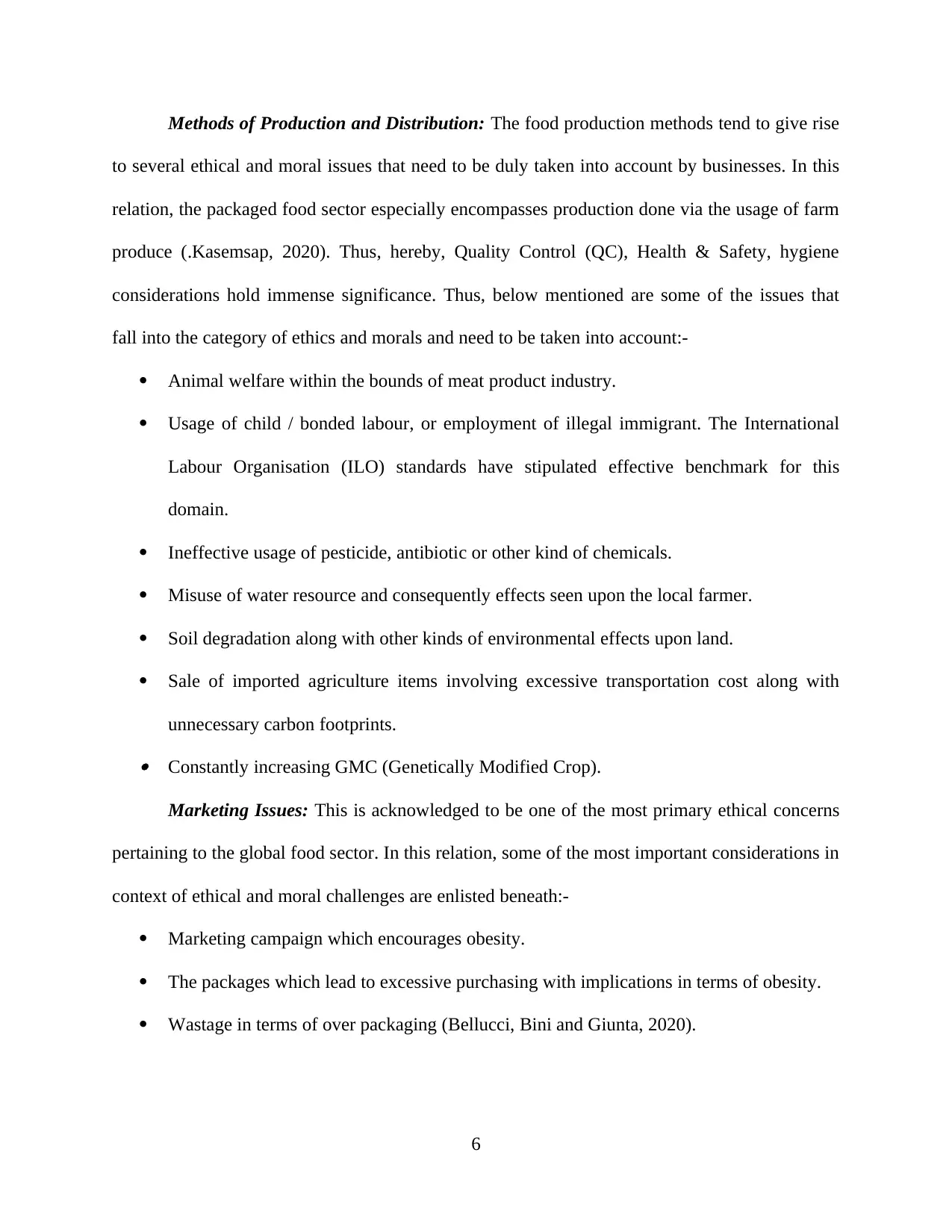
Methods of Production and Distribution: The food production methods tend to give rise
to several ethical and moral issues that need to be duly taken into account by businesses. In this
relation, the packaged food sector especially encompasses production done via the usage of farm
produce (.Kasemsap, 2020). Thus, hereby, Quality Control (QC), Health & Safety, hygiene
considerations hold immense significance. Thus, below mentioned are some of the issues that
fall into the category of ethics and morals and need to be taken into account:-
Animal welfare within the bounds of meat product industry.
Usage of child / bonded labour, or employment of illegal immigrant. The International
Labour Organisation (ILO) standards have stipulated effective benchmark for this
domain.
Ineffective usage of pesticide, antibiotic or other kind of chemicals.
Misuse of water resource and consequently effects seen upon the local farmer.
Soil degradation along with other kinds of environmental effects upon land.
Sale of imported agriculture items involving excessive transportation cost along with
unnecessary carbon footprints. Constantly increasing GMC (Genetically Modified Crop).
Marketing Issues: This is acknowledged to be one of the most primary ethical concerns
pertaining to the global food sector. In this relation, some of the most important considerations in
context of ethical and moral challenges are enlisted beneath:-
Marketing campaign which encourages obesity.
The packages which lead to excessive purchasing with implications in terms of obesity.
Wastage in terms of over packaging (Bellucci, Bini and Giunta, 2020).
6
to several ethical and moral issues that need to be duly taken into account by businesses. In this
relation, the packaged food sector especially encompasses production done via the usage of farm
produce (.Kasemsap, 2020). Thus, hereby, Quality Control (QC), Health & Safety, hygiene
considerations hold immense significance. Thus, below mentioned are some of the issues that
fall into the category of ethics and morals and need to be taken into account:-
Animal welfare within the bounds of meat product industry.
Usage of child / bonded labour, or employment of illegal immigrant. The International
Labour Organisation (ILO) standards have stipulated effective benchmark for this
domain.
Ineffective usage of pesticide, antibiotic or other kind of chemicals.
Misuse of water resource and consequently effects seen upon the local farmer.
Soil degradation along with other kinds of environmental effects upon land.
Sale of imported agriculture items involving excessive transportation cost along with
unnecessary carbon footprints. Constantly increasing GMC (Genetically Modified Crop).
Marketing Issues: This is acknowledged to be one of the most primary ethical concerns
pertaining to the global food sector. In this relation, some of the most important considerations in
context of ethical and moral challenges are enlisted beneath:-
Marketing campaign which encourages obesity.
The packages which lead to excessive purchasing with implications in terms of obesity.
Wastage in terms of over packaging (Bellucci, Bini and Giunta, 2020).
6
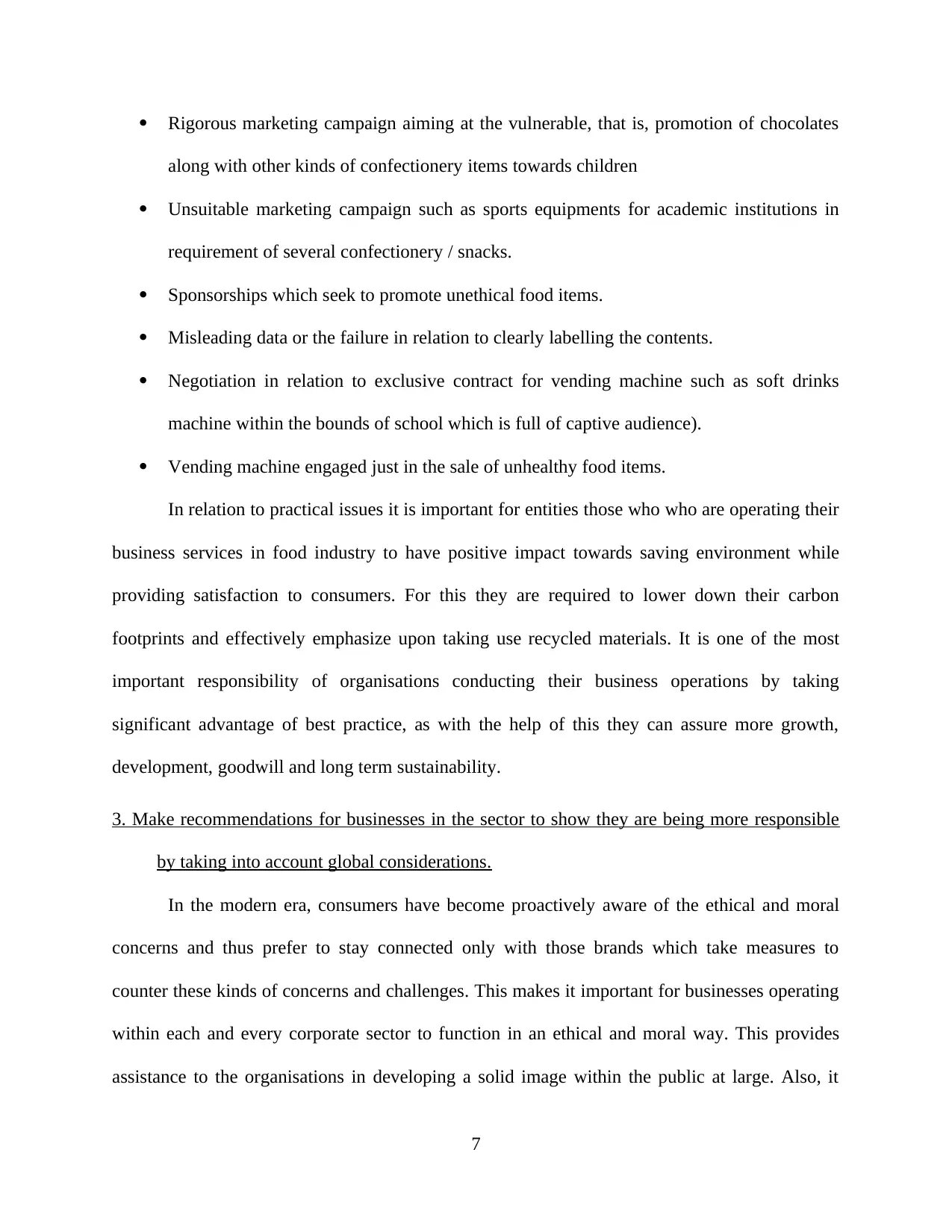
Rigorous marketing campaign aiming at the vulnerable, that is, promotion of chocolates
along with other kinds of confectionery items towards children
Unsuitable marketing campaign such as sports equipments for academic institutions in
requirement of several confectionery / snacks.
Sponsorships which seek to promote unethical food items.
Misleading data or the failure in relation to clearly labelling the contents.
Negotiation in relation to exclusive contract for vending machine such as soft drinks
machine within the bounds of school which is full of captive audience).
Vending machine engaged just in the sale of unhealthy food items.
In relation to practical issues it is important for entities those who who are operating their
business services in food industry to have positive impact towards saving environment while
providing satisfaction to consumers. For this they are required to lower down their carbon
footprints and effectively emphasize upon taking use recycled materials. It is one of the most
important responsibility of organisations conducting their business operations by taking
significant advantage of best practice, as with the help of this they can assure more growth,
development, goodwill and long term sustainability.
3. Make recommendations for businesses in the sector to show they are being more responsible
by taking into account global considerations.
In the modern era, consumers have become proactively aware of the ethical and moral
concerns and thus prefer to stay connected only with those brands which take measures to
counter these kinds of concerns and challenges. This makes it important for businesses operating
within each and every corporate sector to function in an ethical and moral way. This provides
assistance to the organisations in developing a solid image within the public at large. Also, it
7
along with other kinds of confectionery items towards children
Unsuitable marketing campaign such as sports equipments for academic institutions in
requirement of several confectionery / snacks.
Sponsorships which seek to promote unethical food items.
Misleading data or the failure in relation to clearly labelling the contents.
Negotiation in relation to exclusive contract for vending machine such as soft drinks
machine within the bounds of school which is full of captive audience).
Vending machine engaged just in the sale of unhealthy food items.
In relation to practical issues it is important for entities those who who are operating their
business services in food industry to have positive impact towards saving environment while
providing satisfaction to consumers. For this they are required to lower down their carbon
footprints and effectively emphasize upon taking use recycled materials. It is one of the most
important responsibility of organisations conducting their business operations by taking
significant advantage of best practice, as with the help of this they can assure more growth,
development, goodwill and long term sustainability.
3. Make recommendations for businesses in the sector to show they are being more responsible
by taking into account global considerations.
In the modern era, consumers have become proactively aware of the ethical and moral
concerns and thus prefer to stay connected only with those brands which take measures to
counter these kinds of concerns and challenges. This makes it important for businesses operating
within each and every corporate sector to function in an ethical and moral way. This provides
assistance to the organisations in developing a solid image within the public at large. Also, it
7
Secure Best Marks with AI Grader
Need help grading? Try our AI Grader for instant feedback on your assignments.
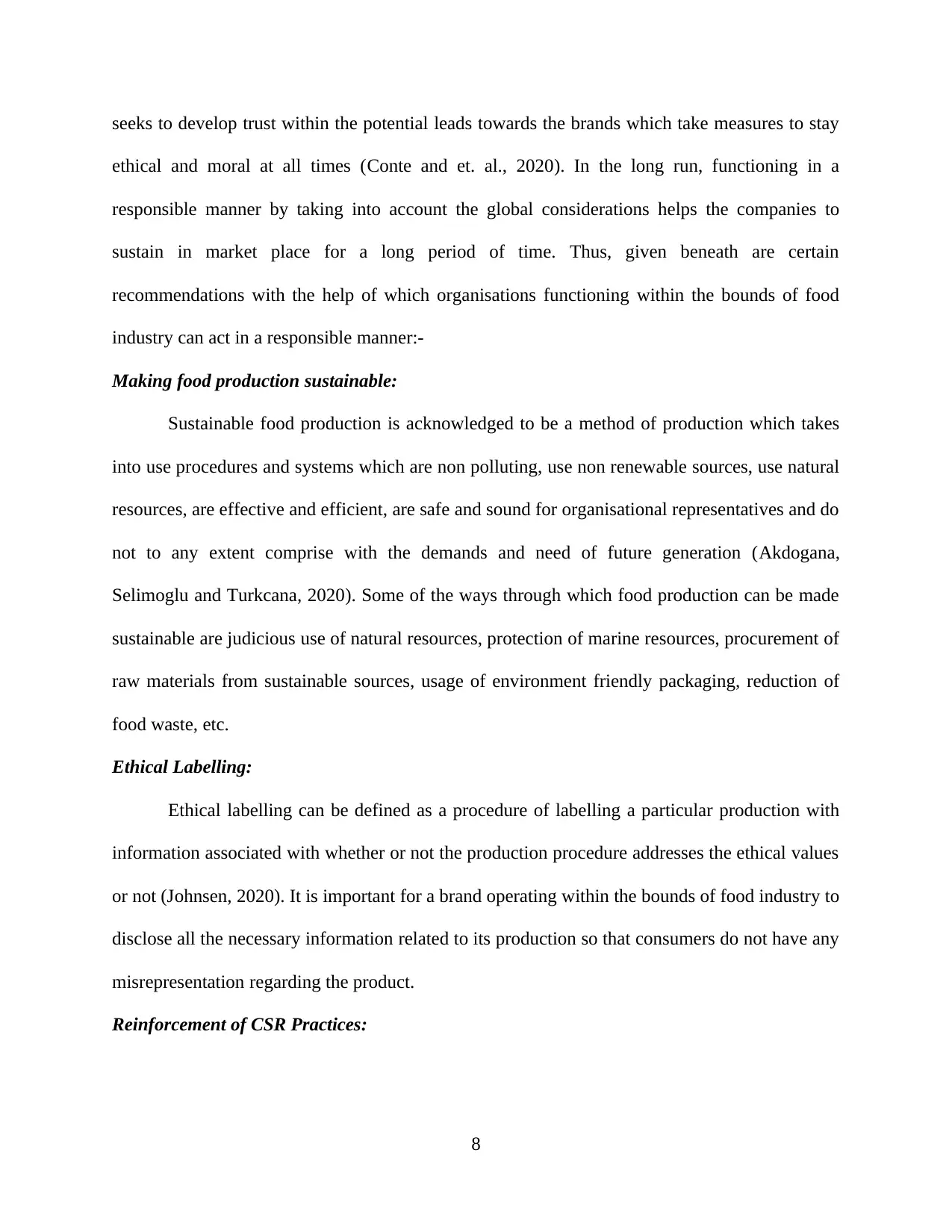
seeks to develop trust within the potential leads towards the brands which take measures to stay
ethical and moral at all times (Conte and et. al., 2020). In the long run, functioning in a
responsible manner by taking into account the global considerations helps the companies to
sustain in market place for a long period of time. Thus, given beneath are certain
recommendations with the help of which organisations functioning within the bounds of food
industry can act in a responsible manner:-
Making food production sustainable:
Sustainable food production is acknowledged to be a method of production which takes
into use procedures and systems which are non polluting, use non renewable sources, use natural
resources, are effective and efficient, are safe and sound for organisational representatives and do
not to any extent comprise with the demands and need of future generation (Akdogana,
Selimoglu and Turkcana, 2020). Some of the ways through which food production can be made
sustainable are judicious use of natural resources, protection of marine resources, procurement of
raw materials from sustainable sources, usage of environment friendly packaging, reduction of
food waste, etc.
Ethical Labelling:
Ethical labelling can be defined as a procedure of labelling a particular production with
information associated with whether or not the production procedure addresses the ethical values
or not (Johnsen, 2020). It is important for a brand operating within the bounds of food industry to
disclose all the necessary information related to its production so that consumers do not have any
misrepresentation regarding the product.
Reinforcement of CSR Practices:
8
ethical and moral at all times (Conte and et. al., 2020). In the long run, functioning in a
responsible manner by taking into account the global considerations helps the companies to
sustain in market place for a long period of time. Thus, given beneath are certain
recommendations with the help of which organisations functioning within the bounds of food
industry can act in a responsible manner:-
Making food production sustainable:
Sustainable food production is acknowledged to be a method of production which takes
into use procedures and systems which are non polluting, use non renewable sources, use natural
resources, are effective and efficient, are safe and sound for organisational representatives and do
not to any extent comprise with the demands and need of future generation (Akdogana,
Selimoglu and Turkcana, 2020). Some of the ways through which food production can be made
sustainable are judicious use of natural resources, protection of marine resources, procurement of
raw materials from sustainable sources, usage of environment friendly packaging, reduction of
food waste, etc.
Ethical Labelling:
Ethical labelling can be defined as a procedure of labelling a particular production with
information associated with whether or not the production procedure addresses the ethical values
or not (Johnsen, 2020). It is important for a brand operating within the bounds of food industry to
disclose all the necessary information related to its production so that consumers do not have any
misrepresentation regarding the product.
Reinforcement of CSR Practices:
8
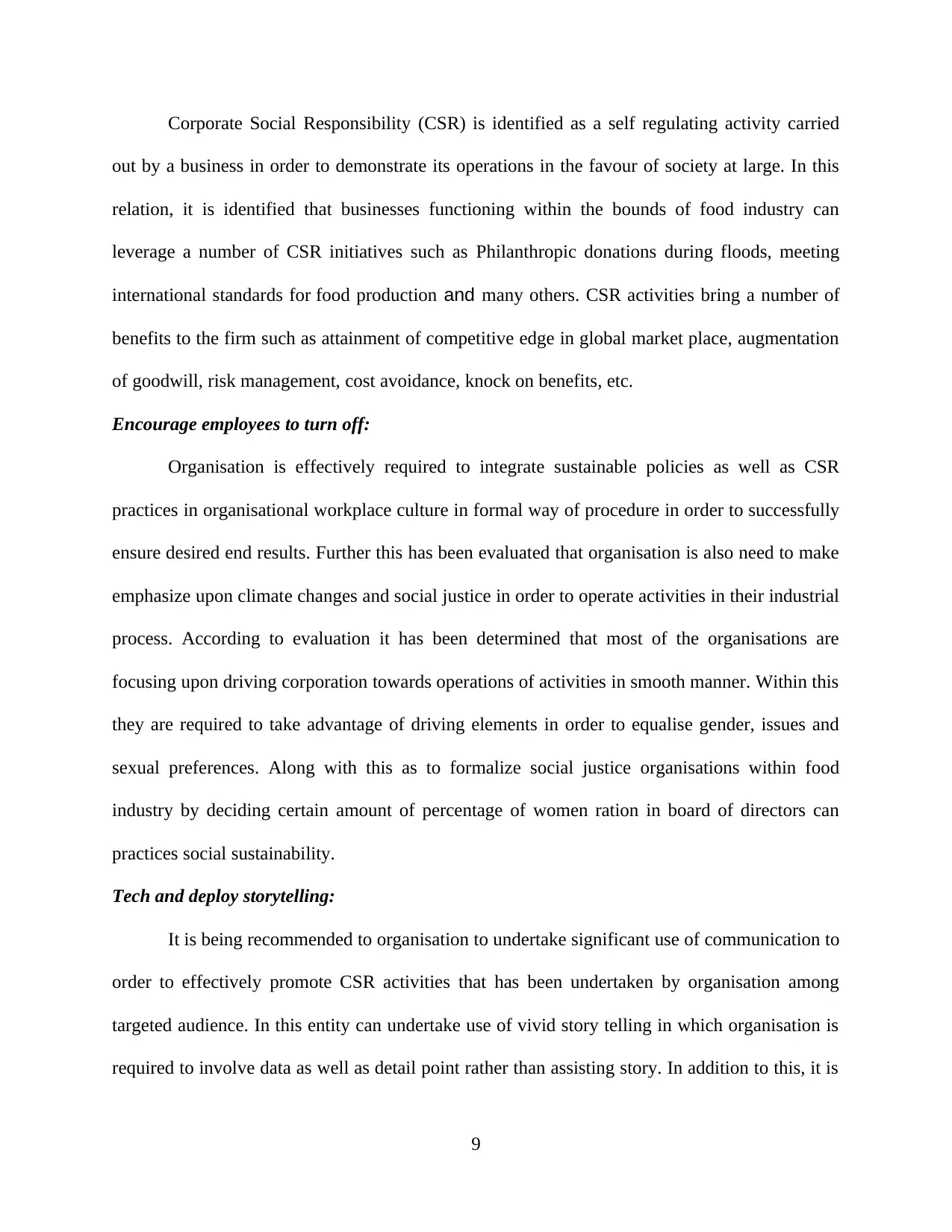
Corporate Social Responsibility (CSR) is identified as a self regulating activity carried
out by a business in order to demonstrate its operations in the favour of society at large. In this
relation, it is identified that businesses functioning within the bounds of food industry can
leverage a number of CSR initiatives such as Philanthropic donations during floods, meeting
international standards for food production and many others. CSR activities bring a number of
benefits to the firm such as attainment of competitive edge in global market place, augmentation
of goodwill, risk management, cost avoidance, knock on benefits, etc.
Encourage employees to turn off:
Organisation is effectively required to integrate sustainable policies as well as CSR
practices in organisational workplace culture in formal way of procedure in order to successfully
ensure desired end results. Further this has been evaluated that organisation is also need to make
emphasize upon climate changes and social justice in order to operate activities in their industrial
process. According to evaluation it has been determined that most of the organisations are
focusing upon driving corporation towards operations of activities in smooth manner. Within this
they are required to take advantage of driving elements in order to equalise gender, issues and
sexual preferences. Along with this as to formalize social justice organisations within food
industry by deciding certain amount of percentage of women ration in board of directors can
practices social sustainability.
Tech and deploy storytelling:
It is being recommended to organisation to undertake significant use of communication to
order to effectively promote CSR activities that has been undertaken by organisation among
targeted audience. In this entity can undertake use of vivid story telling in which organisation is
required to involve data as well as detail point rather than assisting story. In addition to this, it is
9
out by a business in order to demonstrate its operations in the favour of society at large. In this
relation, it is identified that businesses functioning within the bounds of food industry can
leverage a number of CSR initiatives such as Philanthropic donations during floods, meeting
international standards for food production and many others. CSR activities bring a number of
benefits to the firm such as attainment of competitive edge in global market place, augmentation
of goodwill, risk management, cost avoidance, knock on benefits, etc.
Encourage employees to turn off:
Organisation is effectively required to integrate sustainable policies as well as CSR
practices in organisational workplace culture in formal way of procedure in order to successfully
ensure desired end results. Further this has been evaluated that organisation is also need to make
emphasize upon climate changes and social justice in order to operate activities in their industrial
process. According to evaluation it has been determined that most of the organisations are
focusing upon driving corporation towards operations of activities in smooth manner. Within this
they are required to take advantage of driving elements in order to equalise gender, issues and
sexual preferences. Along with this as to formalize social justice organisations within food
industry by deciding certain amount of percentage of women ration in board of directors can
practices social sustainability.
Tech and deploy storytelling:
It is being recommended to organisation to undertake significant use of communication to
order to effectively promote CSR activities that has been undertaken by organisation among
targeted audience. In this entity can undertake use of vivid story telling in which organisation is
required to involve data as well as detail point rather than assisting story. In addition to this, it is
9
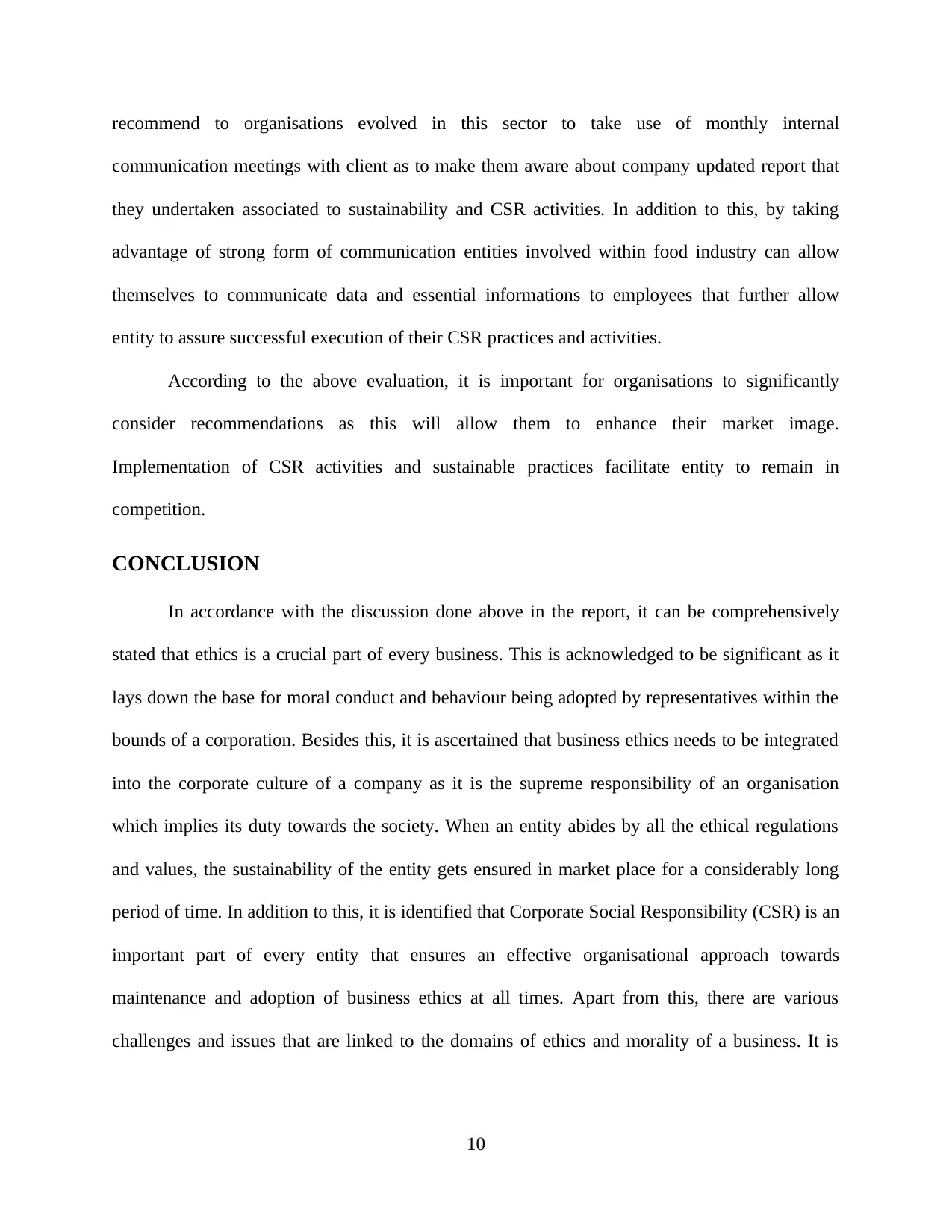
recommend to organisations evolved in this sector to take use of monthly internal
communication meetings with client as to make them aware about company updated report that
they undertaken associated to sustainability and CSR activities. In addition to this, by taking
advantage of strong form of communication entities involved within food industry can allow
themselves to communicate data and essential informations to employees that further allow
entity to assure successful execution of their CSR practices and activities.
According to the above evaluation, it is important for organisations to significantly
consider recommendations as this will allow them to enhance their market image.
Implementation of CSR activities and sustainable practices facilitate entity to remain in
competition.
CONCLUSION
In accordance with the discussion done above in the report, it can be comprehensively
stated that ethics is a crucial part of every business. This is acknowledged to be significant as it
lays down the base for moral conduct and behaviour being adopted by representatives within the
bounds of a corporation. Besides this, it is ascertained that business ethics needs to be integrated
into the corporate culture of a company as it is the supreme responsibility of an organisation
which implies its duty towards the society. When an entity abides by all the ethical regulations
and values, the sustainability of the entity gets ensured in market place for a considerably long
period of time. In addition to this, it is identified that Corporate Social Responsibility (CSR) is an
important part of every entity that ensures an effective organisational approach towards
maintenance and adoption of business ethics at all times. Apart from this, there are various
challenges and issues that are linked to the domains of ethics and morality of a business. It is
10
communication meetings with client as to make them aware about company updated report that
they undertaken associated to sustainability and CSR activities. In addition to this, by taking
advantage of strong form of communication entities involved within food industry can allow
themselves to communicate data and essential informations to employees that further allow
entity to assure successful execution of their CSR practices and activities.
According to the above evaluation, it is important for organisations to significantly
consider recommendations as this will allow them to enhance their market image.
Implementation of CSR activities and sustainable practices facilitate entity to remain in
competition.
CONCLUSION
In accordance with the discussion done above in the report, it can be comprehensively
stated that ethics is a crucial part of every business. This is acknowledged to be significant as it
lays down the base for moral conduct and behaviour being adopted by representatives within the
bounds of a corporation. Besides this, it is ascertained that business ethics needs to be integrated
into the corporate culture of a company as it is the supreme responsibility of an organisation
which implies its duty towards the society. When an entity abides by all the ethical regulations
and values, the sustainability of the entity gets ensured in market place for a considerably long
period of time. In addition to this, it is identified that Corporate Social Responsibility (CSR) is an
important part of every entity that ensures an effective organisational approach towards
maintenance and adoption of business ethics at all times. Apart from this, there are various
challenges and issues that are linked to the domains of ethics and morality of a business. It is
10
Paraphrase This Document
Need a fresh take? Get an instant paraphrase of this document with our AI Paraphraser
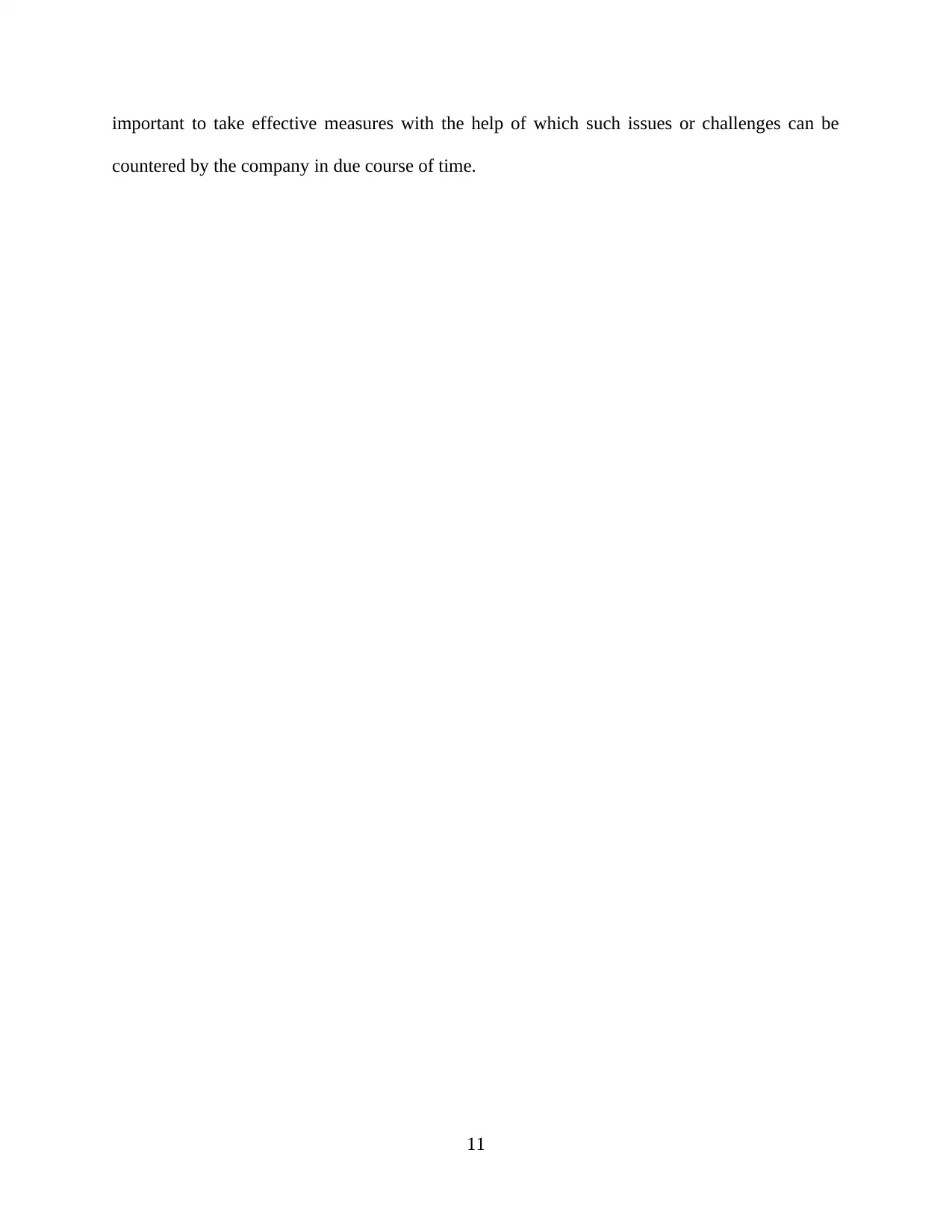
important to take effective measures with the help of which such issues or challenges can be
countered by the company in due course of time.
11
countered by the company in due course of time.
11

12
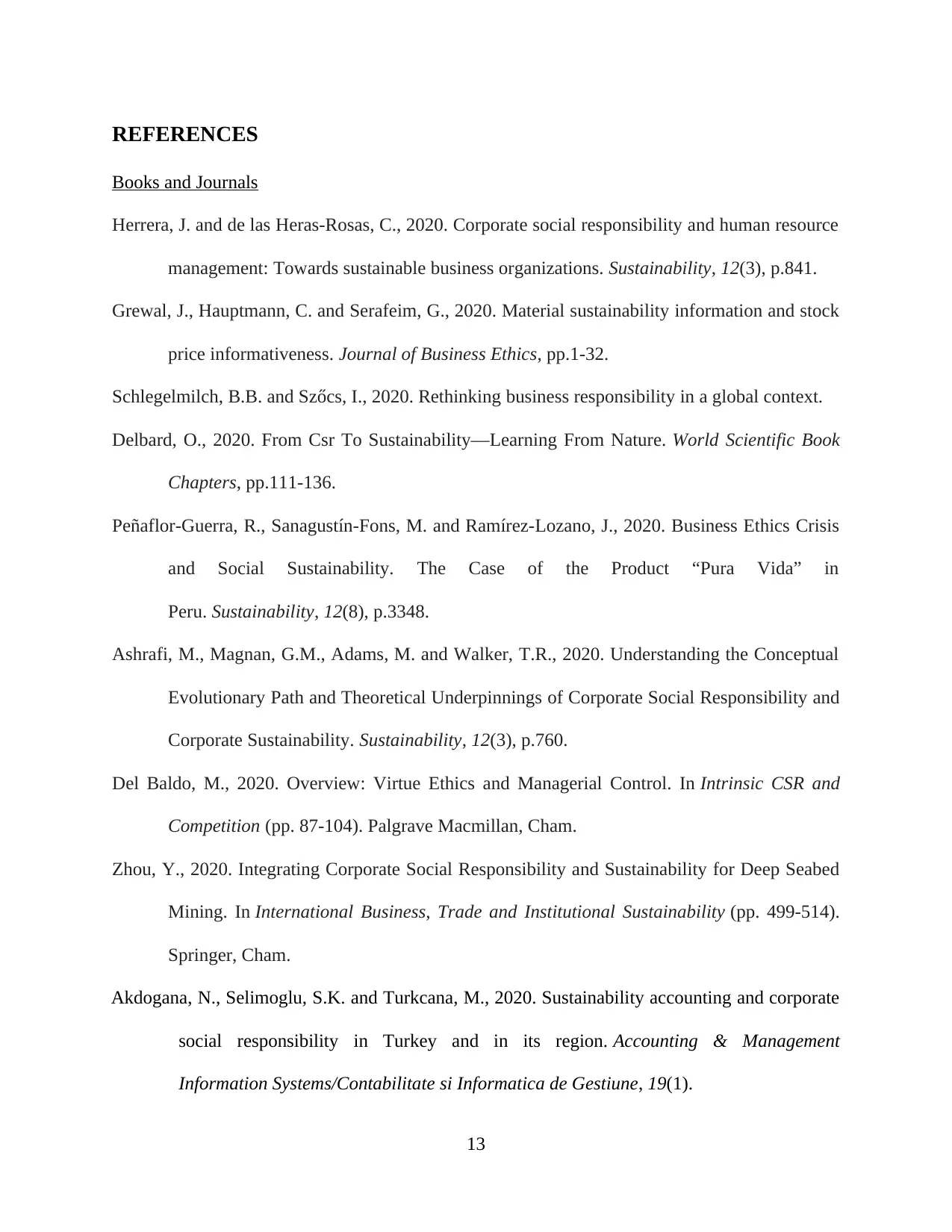
REFERENCES
Books and Journals
Herrera, J. and de las Heras-Rosas, C., 2020. Corporate social responsibility and human resource
management: Towards sustainable business organizations. Sustainability, 12(3), p.841.
Grewal, J., Hauptmann, C. and Serafeim, G., 2020. Material sustainability information and stock
price informativeness. Journal of Business Ethics, pp.1-32.
Schlegelmilch, B.B. and Szőcs, I., 2020. Rethinking business responsibility in a global context.
Delbard, O., 2020. From Csr To Sustainability—Learning From Nature. World Scientific Book
Chapters, pp.111-136.
Peñaflor-Guerra, R., Sanagustín-Fons, M. and Ramírez-Lozano, J., 2020. Business Ethics Crisis
and Social Sustainability. The Case of the Product “Pura Vida” in
Peru. Sustainability, 12(8), p.3348.
Ashrafi, M., Magnan, G.M., Adams, M. and Walker, T.R., 2020. Understanding the Conceptual
Evolutionary Path and Theoretical Underpinnings of Corporate Social Responsibility and
Corporate Sustainability. Sustainability, 12(3), p.760.
Del Baldo, M., 2020. Overview: Virtue Ethics and Managerial Control. In Intrinsic CSR and
Competition (pp. 87-104). Palgrave Macmillan, Cham.
Zhou, Y., 2020. Integrating Corporate Social Responsibility and Sustainability for Deep Seabed
Mining. In International Business, Trade and Institutional Sustainability (pp. 499-514).
Springer, Cham.
Akdogana, N., Selimoglu, S.K. and Turkcana, M., 2020. Sustainability accounting and corporate
social responsibility in Turkey and in its region. Accounting & Management
Information Systems/Contabilitate si Informatica de Gestiune, 19(1).
13
Books and Journals
Herrera, J. and de las Heras-Rosas, C., 2020. Corporate social responsibility and human resource
management: Towards sustainable business organizations. Sustainability, 12(3), p.841.
Grewal, J., Hauptmann, C. and Serafeim, G., 2020. Material sustainability information and stock
price informativeness. Journal of Business Ethics, pp.1-32.
Schlegelmilch, B.B. and Szőcs, I., 2020. Rethinking business responsibility in a global context.
Delbard, O., 2020. From Csr To Sustainability—Learning From Nature. World Scientific Book
Chapters, pp.111-136.
Peñaflor-Guerra, R., Sanagustín-Fons, M. and Ramírez-Lozano, J., 2020. Business Ethics Crisis
and Social Sustainability. The Case of the Product “Pura Vida” in
Peru. Sustainability, 12(8), p.3348.
Ashrafi, M., Magnan, G.M., Adams, M. and Walker, T.R., 2020. Understanding the Conceptual
Evolutionary Path and Theoretical Underpinnings of Corporate Social Responsibility and
Corporate Sustainability. Sustainability, 12(3), p.760.
Del Baldo, M., 2020. Overview: Virtue Ethics and Managerial Control. In Intrinsic CSR and
Competition (pp. 87-104). Palgrave Macmillan, Cham.
Zhou, Y., 2020. Integrating Corporate Social Responsibility and Sustainability for Deep Seabed
Mining. In International Business, Trade and Institutional Sustainability (pp. 499-514).
Springer, Cham.
Akdogana, N., Selimoglu, S.K. and Turkcana, M., 2020. Sustainability accounting and corporate
social responsibility in Turkey and in its region. Accounting & Management
Information Systems/Contabilitate si Informatica de Gestiune, 19(1).
13
Secure Best Marks with AI Grader
Need help grading? Try our AI Grader for instant feedback on your assignments.
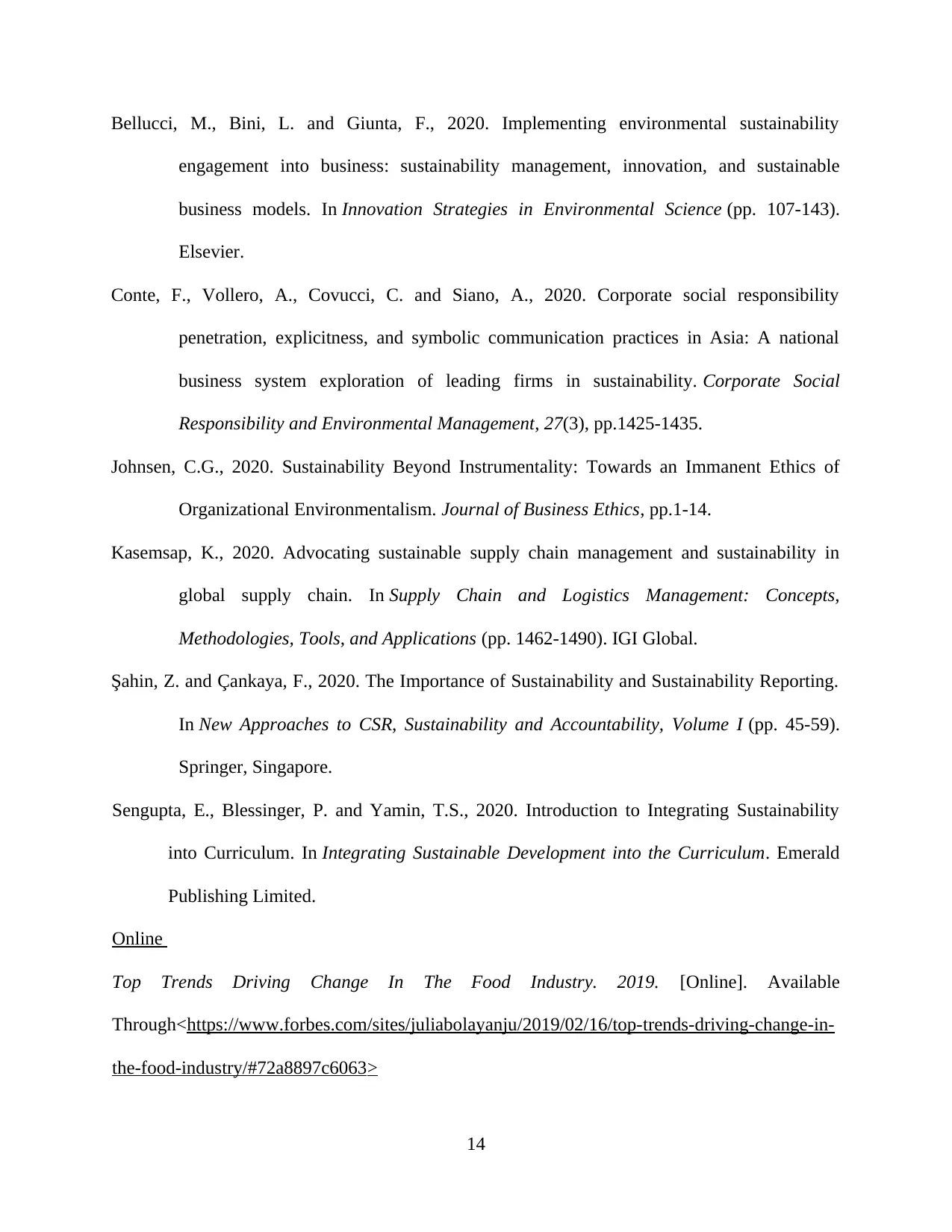
Bellucci, M., Bini, L. and Giunta, F., 2020. Implementing environmental sustainability
engagement into business: sustainability management, innovation, and sustainable
business models. In Innovation Strategies in Environmental Science (pp. 107-143).
Elsevier.
Conte, F., Vollero, A., Covucci, C. and Siano, A., 2020. Corporate social responsibility
penetration, explicitness, and symbolic communication practices in Asia: A national
business system exploration of leading firms in sustainability. Corporate Social
Responsibility and Environmental Management, 27(3), pp.1425-1435.
Johnsen, C.G., 2020. Sustainability Beyond Instrumentality: Towards an Immanent Ethics of
Organizational Environmentalism. Journal of Business Ethics, pp.1-14.
Kasemsap, K., 2020. Advocating sustainable supply chain management and sustainability in
global supply chain. In Supply Chain and Logistics Management: Concepts,
Methodologies, Tools, and Applications (pp. 1462-1490). IGI Global.
Şahin, Z. and Çankaya, F., 2020. The Importance of Sustainability and Sustainability Reporting.
In New Approaches to CSR, Sustainability and Accountability, Volume I (pp. 45-59).
Springer, Singapore.
Sengupta, E., Blessinger, P. and Yamin, T.S., 2020. Introduction to Integrating Sustainability
into Curriculum. In Integrating Sustainable Development into the Curriculum. Emerald
Publishing Limited.
Online
Top Trends Driving Change In The Food Industry. 2019. [Online]. Available
Through<https://www.forbes.com/sites/juliabolayanju/2019/02/16/top-trends-driving-change-in-
the-food-industry/#72a8897c6063>
14
engagement into business: sustainability management, innovation, and sustainable
business models. In Innovation Strategies in Environmental Science (pp. 107-143).
Elsevier.
Conte, F., Vollero, A., Covucci, C. and Siano, A., 2020. Corporate social responsibility
penetration, explicitness, and symbolic communication practices in Asia: A national
business system exploration of leading firms in sustainability. Corporate Social
Responsibility and Environmental Management, 27(3), pp.1425-1435.
Johnsen, C.G., 2020. Sustainability Beyond Instrumentality: Towards an Immanent Ethics of
Organizational Environmentalism. Journal of Business Ethics, pp.1-14.
Kasemsap, K., 2020. Advocating sustainable supply chain management and sustainability in
global supply chain. In Supply Chain and Logistics Management: Concepts,
Methodologies, Tools, and Applications (pp. 1462-1490). IGI Global.
Şahin, Z. and Çankaya, F., 2020. The Importance of Sustainability and Sustainability Reporting.
In New Approaches to CSR, Sustainability and Accountability, Volume I (pp. 45-59).
Springer, Singapore.
Sengupta, E., Blessinger, P. and Yamin, T.S., 2020. Introduction to Integrating Sustainability
into Curriculum. In Integrating Sustainable Development into the Curriculum. Emerald
Publishing Limited.
Online
Top Trends Driving Change In The Food Industry. 2019. [Online]. Available
Through<https://www.forbes.com/sites/juliabolayanju/2019/02/16/top-trends-driving-change-in-
the-food-industry/#72a8897c6063>
14

15
1 out of 18
Related Documents
Your All-in-One AI-Powered Toolkit for Academic Success.
+13062052269
info@desklib.com
Available 24*7 on WhatsApp / Email
![[object Object]](/_next/static/media/star-bottom.7253800d.svg)
Unlock your academic potential
© 2024 | Zucol Services PVT LTD | All rights reserved.





